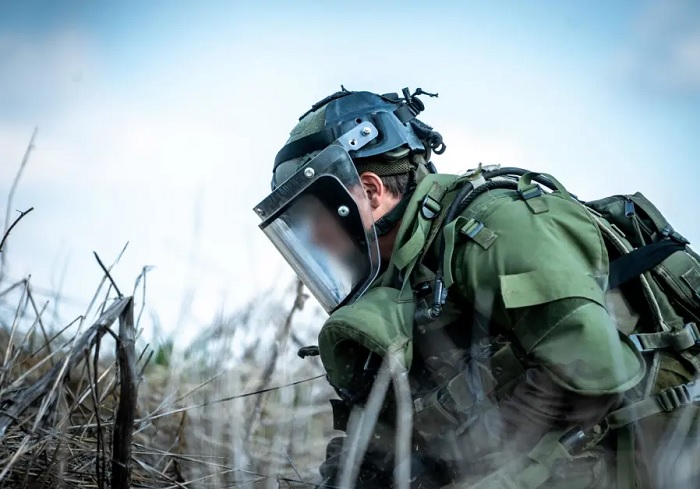
IDF Spokesperson: “We are attacking against the host, and the visitor who is really not wanted.”
Israel struck Iranian and Syrian targets in Syria early Wednesday morning in response to explosive devices found on the border the previous day.
“IDF warplanes attacked military targets belonging to the Iranian Quds Force and the Syrian army tonight in Syria. The attack damaged warehouses, command posts and military complexes, and batteries of surface-to-air missiles,” the IDF said in a statement.
The strikes hit eight targets from the Golan Heights to Damascus, including an Iranian military complex near Damascus International Airport, a secret military barracks which acts as a housing complex for senior Iranian officials as well as visiting delegations, a command post for Division 7 of the Syrian army which cooperates with the Quds Force, and mobile surface-to-air missile trucks which fired toward Israeli jets during the strikes.
Prime Minister Benjamin Netanyahu said that the strikes were part of a policy that he has been “pursuing for years,” and that Israel would not allow for Iran to entrench itself in Syria, nor would it allow for any attempted attack from Syrian territory.
“Whoever tries to attack us, whoever attacks us, will bleed from his head,” Netanyahu warned.
Defense Minister Benny Gantz responded to the strikes on Wednesday morning, saying “I repeat to our enemies – Israel will not tolerate violations of sovereignty on any border, and will not allow dangerous escalations at any border. The Syrian regime is responsible for everything that is done in its territory.”
The military added that “the attack was carried out in response to the placement of explosive charges next to the border fence between Syrian and Israeli territory by a Syrian squad acting under Iranian instruction,” the statement said.
According to IDF Spokesman Brig.-Gen. Hidai Zilberman, the antipersonnel mines discovered yesterday were planted several weeks ago by local Syrians under the command of Iranian Quds Force.The military, he said, has been following cells of the Quds Force for several months that were trying to plant explosives on the border, and has been carrying out patrols – both on foot as well as by drones and reconnaissance – to prevent attacks.
Syria’s state-run SANA news agency reported that Syrian air defenses intercepted the “Israeli aggression” in the south of the country and downed a number of missiles that had been launched.
Three military personnel were killed and one was wounded in the attacks; according to the Syrian Observatory for Human Rights, some 10 personnel were killed. It isn’t clear whether the casualties were Syrian or Iranian-backed troops.
Though the military is not expecting any response to the strikes, the Iron Dome has been deployed to the North, and ground troops have been placed on heightened alert.
Gantz was on a tour of the Northern Command on Tuesday, where he was briefed on the regional situation and troop readiness.
“We have long been prepared for the possibility of terrorist attacks in the northern sector,” he said. “The IDF has the capabilities and the determination to respond severely to any incident both on the Lebanese and Syrian fronts…. I say clearly: Syria is responsible for what occurs on its territory.”
IN AUGUST, IDF troops from the Maglan reconnaissance unit foiled an attempt to place explosives along the border fence with Syria. The four-member cell was killed when the IDF force, supported by aircraft, attacked them.
Following an investigation of the scene, some 25 m. from the perimeter fence inside Israeli territory, weapons and a bag containing a number of explosive devices were found. The action taken against the cell placing the explosives on the border fence was later followed by Israeli airstrikes targeting Syrian positions.
“We understood that the message we sent the other side in August wasn’t fully understood,” said Zilberman on Wednesday, adding that the military wanted the other side, including the local Syrians on the Golan Heights, to understand that working with Iran is “not acceptable.
“We won’t allow Iran to continue to embed themselves in Syria and especially along the border, and we won’t let the Syrians continue to let them. We are attacking against the host, and the visitor who is really not wanted,” Zilberman told reporters, calling on the United Nations Disengagement Observer Force to stop the hostility on the Golan Heights.
“Iranian weapons continue to enter into Syria, and Iranian forces continue to act on the Golan Heights, which is not acceptable,” he added.
Israel has repeatedly warned of Iran’s aspirations of regional hegemony and has admitted to carrying out hundreds of airstrikes as part of its “war between the wars” campaign to prevent the transfer of advanced weapons to Hezbollah in Lebanon and the entrenchment of its forces in Syria, where they could easily act against Israel.
Although Israel usually refrains from targeting terrorist operatives to try to avoid subsequent retaliation, some strikes ascribed to the Jewish state have killed several Hezbollah operatives in southern Syria on the Golan Heights, where the group has been trying to establish a permanent military presence.
According to a report by the ALMA Research and Education Center, Hezbollah’s presence in southern Syria is much larger than previously revealed, with some 58 sites in the southern Syrian provinces of Quneitra and Deraa, where the terrorist group’s Southern Command and Golan Project have been deployed.
 Eurasia Press & News
Eurasia Press & News



